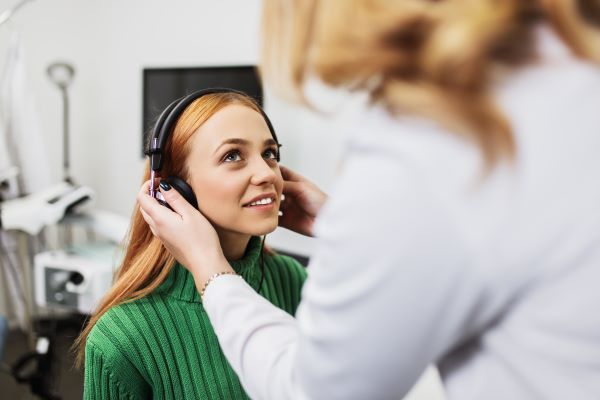Hearing loss is an incredibly common experience for adults in the United States, and yet, despite approximately 40 million adults over the age of 18 reporting some level of hearing loss, only about 12% actually seek treatment. Why is that? Well, we have some suspicions.
Why do we avoid wearing hearing aid technology?
While there are many studies associated with the subject, we can confidently infer from our decades in practice that many do not seek treatment because of stigmas associated with wearing the hearing technology itself (many folks draw upon memories of older, clunkier, and less attractive hearing devices), wrongly associating hearing loss solely with old age, and simply not having a clear sense of our overall hearing health. Let’s pick these apart one-by-one:
Hearing aids are too conspicuous and unattractive.
Well, that might’ve been the case 30 years ago, but since hearing technology switched from analog to digital in the 1990s, hearing aid technology has made great strides in becoming smaller, sleeker, and in a broader array of styles and colors than most can imagine. No matter if you’re someone who is looking for devices to blend in with their skin tone (across a wide spectrum of shades), or enjoy accessorizing with an unbridled sense of pizazz, odds are we have a technology solution for you!
Hearing aids are for old people.
Isn’t age, in many respects, a state of mind more so than a number? Still not convinced? Well, would you say that technology that is smartphone-compatible (iOS and Android), Bluetooth-enabled, and capable of automatically adjusting to the different listening environments that matter most to you is something solely for those we’d consider “old?” These types of devices, where many of the above-described features are now coming as a standard, are enabling folks of all ages to better connect with the people and things that matter most to them in life. Especially now with the advent and acceptance of health monitoring technology, our hope as premier audiology professionals is that people begin to embrace hearing technology, making it as ubiquitous as glasses.
“I don’t have hearing loss” and other denials.
Trust us, we get it. No one wants to have a hearing loss, but it’s an incredibly (and increasingly) common health condition. WIth in-ear devices like earbuds, AirPods, and the like being worn more and more by people of all ages, we’re all putting ourselves at risk for a hearing loss if we don’t use these devices properly, the most notable of which is using these devices for too long at too high a volume.
But here’s the thing — it’s not just technology like earbuds and the like that put you at risk for hearing loss. There are environmental dangers all around us, but we don’t often recognize the dangers (in this case, permanent noise-induced hearing loss) until it’s too late. That said, there’s no need to fear. There are a number of techniques and considerations you can use to provide a lifetime of healthier hearing.
How do I prevent hearing loss?
Hearing loss prevention is relatively simple, and can go a long way in helping you to prolong great hearing health. Here are a few things we recommend:
Wear Protection.
Do you work in a noisy environment? You should note that this isn’t limited to professionals in factories or warehouses. Dental hygienists, landscapers, and plenty of other professions include the use of loud instruments or machines, and are typically subjecting the user to prolonged exposure to noise. Prolonged exposure to noise above 85dBs can cause permanent damage to your hearing! Wear protection each and every day.
If it’s too loud, well, you’re not too old- it’s just too loud!
We’re thrilled that so many are embracing in-ear technology, but we’re concerned that prolonged exposure could cause damage. Many smartphones feature health statistics, including those that monitor the safety level of your earbuds. When it doubt, we always recommend turning the volume down. Custom-molded earpieces are also an option, as their better fit and tighter seal can give you a better listening experience at a lower volume.
Know your medication.
There are many prescription drugs that are considered “ototoxic,” meaning that their prolonged use can cause health complications outside of those they are meant to treat. This includes permanent hearing loss. If you’re taking prescription medication for things like cancer, certain infections, and heart disease, they might include ototoxic side effects. Talk with your physician about the best options for you and your situation.
Get your hearing checked — every year!
We know, we know. The last thing you’re interested in is yet another health appointment, but we promise that this one is absolutely worth it! Hearing loss happens gradually, so gradually that many don’t realize they’re experiencing it until they’ve suffered significant loss. And even then it can take folks as many as four-to-seven years to do anything about! What’s more, many primary care physicians aren’t trained to recommend annual hearing screenings unless their patients are specifically asking about their hearing health. It’s our opinion that no matter what your age, you should get an annual hearing screening, just as you do for your eyes and as you do twice a year for your oral health. This is especially true if you’re over the age of 55, which is when the effects of age on your hearing can become more pronounced, especially in men.
We want you and your loved ones to live a full life with the healthiest hearing possible. If you suspect that you or a loved one might be experiencing a hearing loss (or if you’ve simply decided that now is the time to start booking regular annual screenings), then we’d be honored to serve you. Come see us to understand why your friends and neighbors have made us their hearing wellness choice for 80 years!

